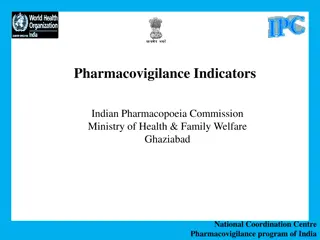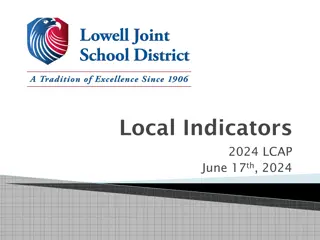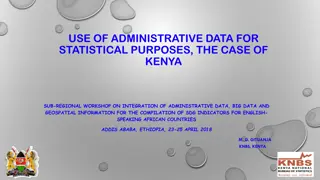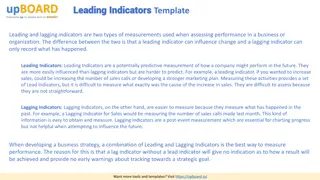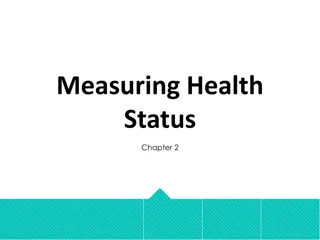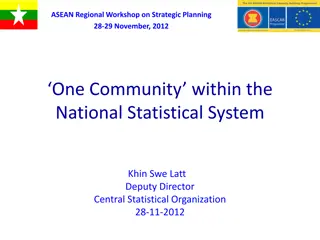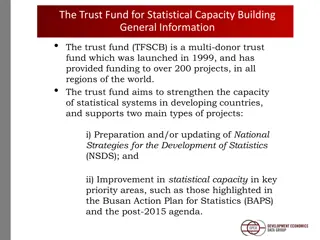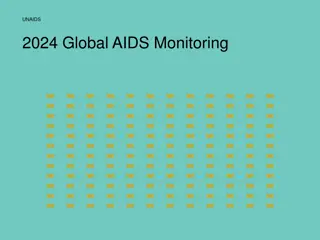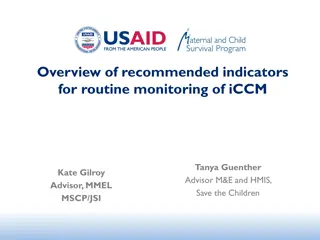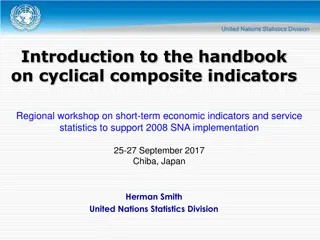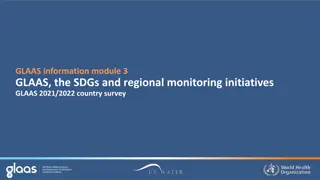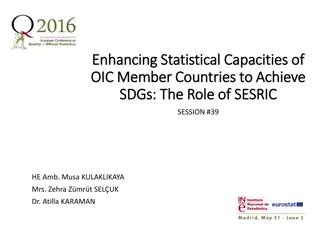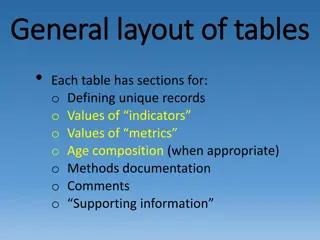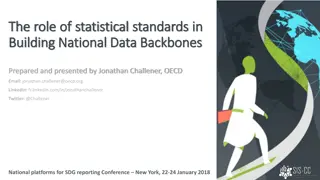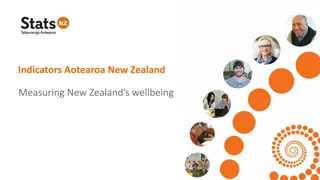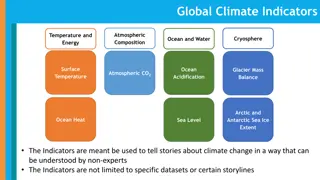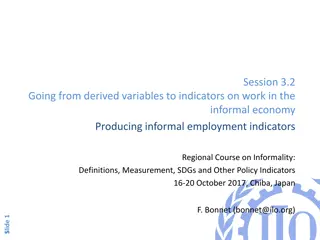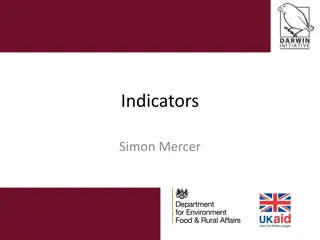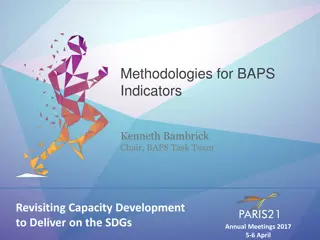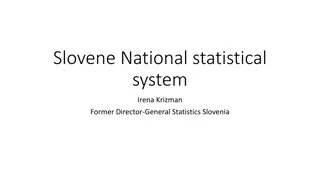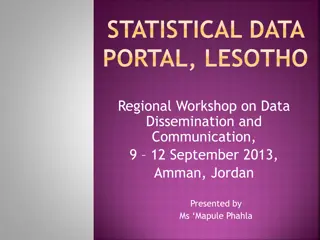Understanding Impact Indicators in Monitoring and Evaluation
Impact indicators play a crucial role in monitoring and evaluating activities, projects, or programs. Direct indicators directly measure results, while indirect indicators are used when direct measures are not feasible. Quantitative indicators are expressed numerically, while qualitative indicators
3 views • 4 slides
Pharmacovigilance Indicators for Monitoring Health Interventions in India
The pharmacovigilance indicators outlined by the Indian Pharmacopoeia Commission focus on evaluating the status of pharmacovigilance systems in India. These indicators help measure the effectiveness of health services and interventions, identify strengths and weaknesses, and determine the impact and
2 views • 14 slides
Ensuring Local Indicators Compliance in California's Education System
The document outlines the required local indicators for LCFF priorities in California schools, emphasizing basics like teachers and facilities, academic standards implementation, and parent engagement. It also touches on school climate, course of study, and the criteria for LEAs/charters to be rated
2 views • 7 slides
Understanding Indicators and Standards in Environmental Management
Exploring the concept of indicators and standards in environmental management, this content delves into their definition, selection process, sources, and importance. Indicators are crucial variables used to track changes caused by human activities, aiding in assessing progress towards desired condit
1 views • 27 slides
Understanding Acids and Alkalis: pH Scale and Indicators
Explore the differences between acids and alkalis, learn about indicators, pH scale, and how to categorize solutions as acidic, alkaline, or neutral. Understand the importance of universal indicators in determining acid and alkali strength. Discover the disadvantages of using red and blue litmus pap
3 views • 11 slides
Understanding Indicators in Strategic Planning and Information Management
Explore the importance of indicators in monitoring and evaluation, learn about different types of indicators such as baseline, output, and outcome. Discover the qualities of a good indicator and the various forms they can take, from direct to qualitative and standardized global indicators versus loc
2 views • 19 slides
Understanding Variation in Statistical Studies
Variability is key in statistical studies, shaping the essence of statistical analysis. Students often struggle to grasp the concept of variability, despite being taught statistical methods. The term "variation" takes on different meanings in various statistical contexts, presenting challenges in co
2 views • 54 slides
Utilizing Administrative Data for Statistical Analysis in Kenya's National Statistical System
Kenya National Bureau of Statistics (KNBS) employs administrative data for statistical purposes, as highlighted in the sub-regional workshop on integrating administrative data, big data, and geospatial information for compiling SDG indicators. The legal and institutional framework, data collection m
0 views • 21 slides
Introduction to Data Collection & Statistics: Understanding Statistical Questions, Population, and Sampling
This material introduces the fundamental concepts of data collection and statistics. Learning objectives include distinguishing statistical questions, identifying populations and samples, and understanding the difference between observational studies and experiments. It discusses the process of stat
1 views • 14 slides
Exploring the Power of Wise Queries in Statistical Learning
Dive into the world of statistical learning with a focus on the impact of wise queries. Discover how statistical problems are approached, the significance of statistical queries, and the comparisons between wise and unary queries. Explore the implications for PAC learning and uncover key insights in
0 views • 8 slides
Understanding Leading and Lagging Indicators in Business
Leading and lagging indicators play crucial roles in assessing the performance of a business or organization. Leading indicators are predictive, influencing future outcomes, while lagging indicators record past events. A strategic combination of both types is essential for measuring performance effe
1 views • 4 slides
Understanding Health Status Indicators and Measurements
Health status indicators play a crucial role in assessing overall health status at individual, group, and population levels. These measurements, such as self-assessed health status and life expectancy, provide valuable insights for governments to identify trends, enact appropriate interventions, and
2 views • 18 slides
Understanding IBM SPSS for Statistical Analysis
IBM SPSS, formerly known as Statistical Package for the Social Sciences, is a powerful software package for statistical analysis used by researchers across various industries. Developed in the late 1960s, SPSS offers features for data management, statistical analysis, and data documentation. It simp
1 views • 13 slides
Overview of Myanmar Statistical System and Central Statistical Organization
The Myanmar Statistical System operates as a decentralized system with the Central Statistical Organization playing a crucial role at the national level. Various surveys and data collection efforts are undertaken by different ministries and agencies, coordinated by the CSO. The CSO compiles and pres
0 views • 18 slides
The Trust Fund for Statistical Capacity Building
The Trust Fund for Statistical Capacity Building (TFSCB) is a multi-donor trust fund launched in 1999, supporting over 200 projects worldwide to strengthen statistical systems in developing countries. It focuses on national strategy development and improving statistical capacity in key priority area
1 views • 5 slides
Updates and New Indicators in 2024 Global AIDS Monitoring Reports
Updates in the 2024 Global AIDS Monitoring reports include new indicators related to gender equality, human rights, and stigma elimination, changes to existing indicators, and terminology updates. Four new indicators focus on gender responsiveness of HIV services, discriminatory attitudes in health
0 views • 21 slides
Overview of Recommended Indicators for Routine Monitoring of iCCM
Process to review and refine iCCM indicators for routine monitoring initiated by the M&E sub-group of the global CCM Task Force. The group developed a list of 10 indicators in 6 domains, including Human Resources, Referrals, Service Delivery, Reporting, Supply Chain, and Clinical Coaching. These ind
0 views • 11 slides
Developing Proxy Indicators for Farm Profitability in Irish Agriculture
This study by Ciara O'Donovan focuses on developing and testing proxy indicators of farm profitability and efficiency measurements for knowledge transfer use on Irish farms. The research aims to identify indicators of farm performance, tailor them based on enterprise, scale, and seasonality, and tes
0 views • 20 slides
Handbook on Cyclical Composite Indicators Overview
This content provides insights into cyclical composite indicators, their objectives, features, and importance in economic analysis. It emphasizes the need for harmonized principles and standards in compiling these indicators for better international comparisons and economic assessments. The handbook
0 views • 23 slides
Early Warning Indicators for Pine Island Glacier in West Antarctica
The study examines the tipping points and early warning indicators for Pine Island Glacier in West Antarctica, a key contributor to sea-level rise. Through an advanced ice flow model, the research reveals three tipping points and their associations with ocean warming. The findings also introduce ear
0 views • 8 slides
Jumping into Statistics: Study Design & Statistical Analysis in Medical Research
Explore the fundamentals of study design & research methodology, learn to select appropriate statistical tests, and practice statistical analysis using JMP Pro Software. Topics include research question formulation, statistical methods, regression, survival analysis, data visualization, and more. Un
0 views • 31 slides
Understanding Energy Indicators and Their Significance in Environmental Analysis
Exploring the importance of energy indicators in environmental analysis, this content delves into various types of indicators, such as econometric, physical, and efficiency indicators. It highlights the need for clear objectives in measurement and coherence between energy aspects and activities. Add
0 views • 18 slides
Comprehensive Overview of GLAAS, SDG Monitoring, and Goal 6 Indicators
The content delves into the Global Analysis and Assessment of Sanitation and Drinking-Water (GLAAS), its relationship with the Sustainable Development Goals (SDGs), particularly Goal 6 on clean water and sanitation. It discusses regional monitoring initiatives, the 2030 Agenda for Sustainable Develo
0 views • 16 slides
Enhancing Statistical Capacities of OIC Member Countries to Achieve SDGs: The Role of SESRIC
This presentation discusses the importance of enhancing statistical capacities in OIC member countries to achieve Sustainable Development Goals (SDGs), with a focus on the role of SESRIC. It covers the evolution of statistical definitions, the use of Statistical Capacity Index (SCI) for analysis, an
2 views • 17 slides
Enhancing Global Statistical Systems for Sustainable Development
The post-2015 development agenda emphasizes the need for a comprehensive global policy agenda, impacting statistical systems worldwide. This agenda seeks to improve data collection, coordinate international statistical efforts, and enhance national statistical systems by 2020 to support the Sustaina
0 views • 23 slides
Challenges and Opportunities in Science and Technology Policy Indicators
Towards creating indicators for the field of science and technology policy, this content discusses the increasing demands in research management and evaluation, the potential role of indicators in decision-making, the drawbacks of conventional indicators, and the current issues with the usage of sci
0 views • 44 slides
Table Layout Guidelines for Data Presentation
Comprehensive guidelines for structuring tables including defining unique records, values of indicators and metrics, age composition, methods documentation, comments, and supporting information. The content outlines the table layouts for values of indicators, metrics, NOSA table indicators and metri
0 views • 26 slides
Role of Statistical Standards in Building National Data Backbones
The role of statistical standards in constructing national data backbones is crucial for efficient data dissemination and reporting, especially in the context of Sustainable Development Goals (SDGs). Statistical standards guide the orchestration of information flows within a national statistical net
0 views • 22 slides
Enhancing Wellbeing: Indicators Aotearoa New Zealand
Indicators Aotearoa New Zealand aims to measure and improve the wellbeing of New Zealanders by tracking environmental, social, and economic progress. The indicators incorporate Māori perspectives and will monitor current and future generations' wellbeing impact. Stakeholders can provide input throu
0 views • 7 slides
Statistical Events in San Diego Area (2001-2003)
Several significant statistical events took place in the San Diego area between 2001 and 2003, featuring renowned speakers and experts in the field. These events covered topics such as meta-analysis, global atmospheric changes, statistical trends, and annual statistical career days. The gatherings p
0 views • 12 slides
Understanding Global Climate Change Indicators
Explore various indicators related to global climate change, including atmospheric composition, temperature, cryosphere, ocean conditions, and extreme weather events. The indicators cover a wide range of topics such as glacier mass balance, ocean acidification, heavy precipitation, droughts, and hea
0 views • 8 slides
Overview of the U.S. Federal Statistical System and Census Geography
The U.S. Federal Statistical System comprises 13 principal statistical agencies responsible for collecting and analyzing data across various sectors. The system includes agencies like the Bureau of Economic Analysis, Bureau of Labor Statistics, and U.S. Census Bureau. Geographic identifiers (GEOIDs
0 views • 94 slides
Understanding Informal Employment Indicators and Their Use in Policy Making
This session focuses on producing indicators related to informal employment and the informal sector, derived from labor force surveys. It covers key indicators on the extent and composition of informal employment, including identifying priority actions for specific groups. The session also discusses
0 views • 36 slides
Understanding Indicators in Monitoring and Evaluation
Indicators play a crucial role in monitoring and evaluation by providing signals of progress and success. They measure change, outcomes, and achievements of projects or programs. Different types of indicators exist, such as quantitative, performance, achievement, and accountability indicators. It is
0 views • 12 slides
Progress on BAPS Indicators and Methodologies Report
The report presents the progress on BAPS Outcome and Output indicators for 2016, evaluating achievements against set milestones. Key areas include integrating statistics in decision-making, promoting open access to statistics, increasing resources for statistical systems, and measuring NSDS quality
0 views • 10 slides
Slovene National Statistical System Overview
The Slovene National Statistical System comprises institutions like the Statistical Office of the Republic of Slovenia and various advisory committees responsible for producing official statistical data following European and UN standards. It emphasizes neutrality, objectivity, transparency, and con
0 views • 9 slides
Enhancing Data Dissemination through the AfDB Statistical Data Portal
Bureau of Statistics (BOS) in Lesotho plays a crucial role in providing official statistics for national development. This presentation focuses on sharing information about the African Development Bank's (AfDB) Statistical Data Portal (DP), a tool designed to meet the increasing demand for statistic
0 views • 21 slides
Understanding Food for Peace Indicators and Evaluation Surveys
This content provides an overview of Food for Peace (FFP) indicators for baseline and final evaluation surveys, with insights on collecting and analyzing data related to key indicators such as household food access, nutrition status, WASH, agriculture, poverty, gender, and family planning. It discus
0 views • 14 slides
Sustainable Development Indicators for Belgium: Progress Towards the SDGs
Belgium's progress on sustainable development indicators towards the Sustainable Development Goals (SDGs) is tracked through a set of global and national indicators. Key updates in the 2024 report include new indicators on child poverty and digital skills, along with revised definitions for capital
0 views • 16 slides
Statistical Tools for Method Validation in USP General Chapter 1210
In the USP General Chapter 1210, Statistical Tools for Method Validation are outlined, serving as a companion to the validation of Compendial Procedures. The chapter covers important topics like Accuracy, Precision, Linearity, LOD, LOQ, and range. It emphasizes statistical tools such as TOST, statis
0 views • 22 slides

